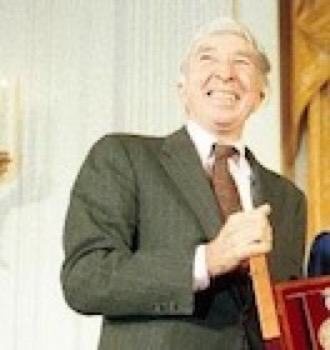John Updike
Literary Critique - Separating
September/07/2016 05:40 PM Filed: Literary Critiques

Photo Credit: Dennis Kan
(Wikimedia Commons)
Defining Marriage in Modern Society
John Updike’s “Separating” is the story of a stereotypical family torn apart by a couple’s decision to part company after many years of marriage. Published in 1975, Updike approaches divorce with the nonchalance of the decade, but beneath his laid-back delivery is subtle condemnation.
It’s not clear which party is at fault even though Richard, the protagonist, is seeing another woman. Joan, his wife, is concerned about the children, but no longer particularly worried about her spouse moving out. They appear to want an open marriage more than they want to disrupt the family.
The narrative is told from Richard’s viewpoint: “His wife slept as if slain beside him.”
He may blame Joan’s waning passion for their breakup, but his disturbed, neurotic behavior manifests itself in any situation with his children when he is expected to announce his desire to leave. Though his wife’s viewpoint is nonexistent, her “sleeping” presence in the background can be felt as the catalyst, implying that Joan chose to end her marriage long before Richard decided to have sex elsewhere. Other than fatigue, the reason is not disclosed.
Updike is poking fun at holy matrimony as well as the concept of religious sacrament. Embedded in his plot is an important reminder to uphold the contemporary legal definition. Marriage is a domestic partnership, not an archaic ritual.
Literary Critique - A&P
May/04/2016 03:15 PM Filed: Literary Critiques

Photo Credit: George Bush Presidential Library
(Wikimedia Commons)
John Updike and the Emerging Feminist
Published in 1962, Updike’s “A&P” depicts a young grocery store clerk working during a decade when women asserted their independence by flaunting sexuality. Written in the first person, this is Sammy’s description of the events that led to his choice to quit his job in defense of a girl’s right to walk into the store underdressed.
Sammy sees all women as sexual creatures and analyzes their qualities as he works. Queenie captures his attention and sympathy when the manager reprimands her for shopping in her two-piece swimming suit.
It is Sammy’s attraction to Queenie that leads to his act of defiance. His view of her as a member of the opposite sex is typical, his reaction to her atypical. The only difference is personal, a subjective response to her body. Other women have not attracted him to the point where he would defend them in any confrontation.
Shortly after he quits and lays down his apron, Sammy looks for Queenie and her friends outside. Although he anticipates her departure, his desire to find her indicates his motivation. At the moment he makes his impulsive decision, his plan thereafter is apparent.
Sammy follows through with his rebellious statement and exits. In the end he regrets his actions and reflects, “…my stomach kind of fell as I felt how hard the world was going to be to me hereafter.”
Although it may seem ridiculous to assert that Updike encouraged emerging feminism by supporting a woman’s right to disrobe, his message in this story does point to his interest in unrestrained self-expression.